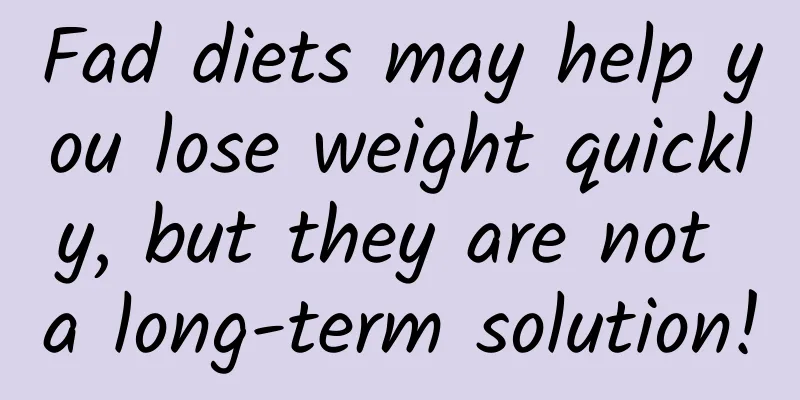Fad diets may help you lose weight quickly, but they are not a long-term solution!

|
People who want to lose weight are often tempted to try the latest fad diet that becomes popular for a short period of time and claims to help people lose weight quickly. But what are fad diets? And do they really help people lose weight long-term? Image source: Pixabay A fad diet is defined as a “quick weight loss method that is usually popular for a short period of time and then fades away.” Another telltale sign of a fad diet is that its claims of success in helping people lose weight are based primarily on anecdotal reports. These diets often don’t have a lot of scientific evidence to back them up – they’re more based on recommendations, and you may see influencers touting benefits that seem too good to be true, which is often how these diets gain traction. Losing weight can be tough, and with the promise of rapid transformation, it's easy to see why these diets are so popular. They offer simple solutions to complex problems, often promising fast results. But fad diets don’t work in the long run. Here, we’ll delve into the science behind them to explore why. However, if you’re considering making a major change to your diet, always consult a nutritionist or doctor first. 0 1. Why don’t fad diets work? Image source: Pixabay The reason fad diets seem to work initially is because they tend to significantly reduce calories or entire food groups, so people often eat fewer calories or restrict portion sizes of certain foods. This puts the body into a calorie deficit, where a person consumes fewer calories than they burn, leading to weight loss. The results are often short-lived because this diet is not sustainable as a lifestyle. This may explain why most people regain the weight after returning to their normal eating patterns. Fad diets also restrict the types of food that may be needed for essential nutrients. According to the British Dietetic Association, commonly restricted food groups include dairy, which is a good source of protein and calcium, and carbohydrates, which are necessary for energy, as well as B vitamins and magnesium. Fad diets may also promote eating only one type of food—for example, the cabbage soup diet—or avoiding all cooked foods. Most popular diets remove entire food groups (fruits, vegetables, grains, etc.) or are extremely restrictive, reinforcing negative associations with food. ” The biggest problem with [fad diets] is the shame-based rhetoric that attributes failure [to weight loss] to a lack of willpower – we know this is simply not true and there are so many factors involved in what, when and how we choose to eat. It’s important to consider these to help us make sustainable changes. A 2020 review published in the journal Cureus also linked dieting to an increased likelihood of developing eating disorders. The researchers said that while it’s difficult to draw any substantive conclusions from the data, the results suggest that dieting as a way to lose weight may carry more risks than benefits. 0 2. Holistic lifestyle Ultimately, weight loss requires a long-term approach. It’s not sexy or trendy, but good old-fashioned hard work and consistent effort is what drives sustainable weight loss, and it’s not about quick fixes – slow and steady wins the race. Sustainable weight loss requires a whole lifestyle approach, not just a focus on food. Many fad diets overlook the role of exercise, which is essential for optimal health, and they often ignore other important factors as well. Psychology also comes into play, and you need to know which foods may undermine the effects of emotional eating. Getting proper sleep is also very important for sustainable weight loss. Lack of sleep can lead to increased cortisol levels [the stress hormone], which can cause hunger pangs. Long-term healthy eating also needs to be integrated into the rest of a person's life. Remember, any dietary change must be enjoyable to be sustainable, so focus on including foods you enjoy and foods that fit in with your food culture and family. Source: Chongqing Tianji Network Co., Ltd. Source: Live Science "Why fad diets don't work, according to experts" Statement: Except for original content and special notes, some pictures are from the Internet. They are not for commercial purposes and are only used as popular science materials. The copyright belongs to the original authors. If there is any infringement, please contact us to delete them. |
<<: What effects does alcohol have on our body? This article tells you~
>>: Attention! Eating unripe beans can cause poisoning!
Recommend
Breast cancer definition and treatment
Women's bodies also need to be well maintaine...
Should I drink more water after an abortion?
Pregnancy is a major event in a woman's life....
Is breast burning a disease?
Breasts are the main reproductive organs of women...
Early symptoms of ectopic pregnancy
Every woman is afraid of ectopic pregnancy. For w...
What is the reason for itching and odor in the lower body?
Itching and odor in the lower body can be said to...
What are the causes of inverted nipples?
The development of nipples determines whether wom...
Can women drink red wine during menstruation?
In life, everyone should know that red wine is ve...
What tests can detect cervical polyps?
Cervical polyps are a manifestation of chronic ce...
Vulvar pimples and internal heat
I believe that everyone is afraid of suffering fr...
Why do girls have itchy lower body?
Under normal circumstances, the private parts of ...
Why does the buttocks hurt after the uterine contraction injection?
Women also need to do some recovery programs afte...
What disease is it that causes pain in the lower body when standing up after childbirth?
After giving birth, the mother must have a good r...
How to cure bacterial vaginitis
When women suffer from bacterial vaginitis, they ...
Why does pregnant women eat more?
The happiest time for every woman is being a moth...
Can you bring food into Shanghai Disneyland? How to take your kids to Shanghai Disneyland?
Disney's cartoon characters have accompanied ...









